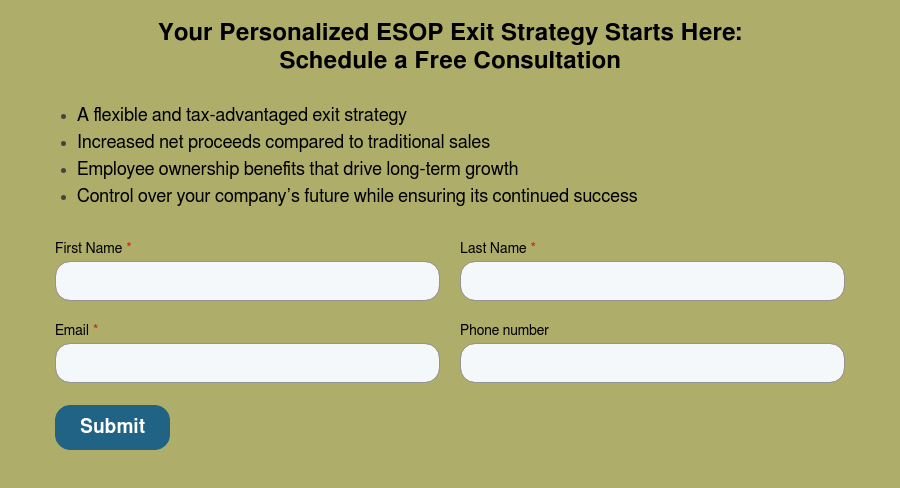Industry Trends
Largest Transactions Closed
- Target
- Buyer
- Value($mm)
Last updated:
Not all quarterbacks are created equal. Just as a champion football team must choose a quarterback with the right capabilities and skill set to bring home the Lombardi trophy, hiring your “ESOP quarterback”—the advisor who will lead and coordinate the various parties involved in your ESOP transaction—is an essential part of getting your deal across the goal line.
An ESOP quarterback is typically an experienced professional, such as an investment banker, an attorney, or another consultant, who has extensive knowledge of ESOPs and can provide guidance and support throughout your entire transaction process—all the way through the closing. As you consider various professionals for the job, ask lots of questions before you decide on who should call the plays.
To help you and your team move the ball down the field, choose an ESOP quarterback who can live up to your expectations in performing the following tasks.
Your ESOP quarterback’s process should start with helping determine whether an ESOP is right for you. Conducting an initial ESOP feasibility study is a crucial first step to evaluating financial viability and structuring options. ESOPs are often complex, multifaceted transactions that require thoughtful planning, coordination, and execution. Determining whether this structure is the right fit for your business is generally a two-part process:
Some ESOP quarterbacks focus solely on ESOP transactions and may be unable to properly assess all of your options. Understanding the five key factors to consider before selling to an ESOP can help you evaluate whether this structure aligns with your long-term business goals. Investment bankers with experience in handling mergers and acquisitions as well as ESOPs are well positioned to provide advice on M&A and equity/debt capital raise alternatives. Certain investment bankers can also run a “dual track” process, allowing owners to test both ESOP and M&A exits before making a final decision. Forgoing an investment banker as your ESOP quarterback could severely limit your offenses capabilities. While attorneys can structure transactions, it is helpful to have an investment banker in play throughout the transaction to advise on all financial aspects of the transaction.
Hiring an experienced ESOP quarterback who has expertise, knowledge, and references (and whom you trust!) can ensure your transaction runs smoothly—so you can focus on running your business. ESOP quarterbacks will generally “call their own number” within their area of expertise: Attorneys act as lead counsel during the transaction. Third-party administrators advise on future benefit levels. But investment bankers see the entire field, just as a quarterback must; they serve as financial advisor to the company and its selling shareholders, providing advice on value, capital markets, and other liquidity options.
Another metaphor is useful here—for instance, consider hiring a design-build general contractor to create your dream home. When relying on this full-service contractor, you will meet frequently to establish the optimal design—one that both meets your goals (the size and layout of your future home) and respects your constraints (any budget, timing, or other limitations you may face). The design-build contractor has the expertise and relationships to develop and execute the entire plan and to subcontract elements of the build as necessary, allowing you to be hands-off on the building process.
The same is true of your ESOP quarterback, particularly if you select an ESOP investment banker. You could choose a regular contractor (or forgo using one altogether!), but drafting an investment banker as your ESOP quarterback could help you sidestep numerous perils along your journey to the end zone.
How you compensate your ESOP quarterback depends on the type of professional and the complexity of the transaction. Attorneys typically charge based on their hourly rate—an approach that is often perceived as the less expensive route for an ESOP deal. This may be true for transactions that are less complicated, but fees can mount quickly if your transaction is modified or delayed. And in the event the transaction does not close, you could be out those fees anyway.
Financial advisors, on the other hand, may structure their fees on a contingency or an hourly basis, with certain aspects (such as a valuation or feasibility analysis) performed at a fixed-fee rate. The popular contingency-based structure not only avoids the downside risks of hourly rates, but also aligns the incentives of your ESOP quarterback and your selling shareholders. This arrangement makes sense if you are motivated to close a transaction in a reasonable period while maximizing liquidity. The contingency-based structure also limits the transaction fees, so changes to the transaction do not materially increase fees.
When engaging an ESOP quarterback, consider the professional’s skill set and how it pertains to your needs. Your ESOP quarterback should be prepared to lead your team while running each of the following plays to ensure the transaction meets your goals and objectives.
Set expectations for value, liquidity, and timing
As a business owner preparing to enter an ESOP deal, you’ll want to understand your company’s value (i.e., the sale price), your available liquidity (i.e., the cash at closing), and the time required to execute the transaction. Investment bankers in particular are well positioned to advise on value, liquidity, and timing. Other professionals may be more like “armchair quarterbacks” who must rely on you for that information—or refer you to another advisor for certain components.
Establish the optimal structure
ESOPs are extremely flexible in their design. Your ESOP quarterback will work with your company and the selling shareholders to determine the optimal ESOP structure for your unique situation. Typically, this step involves conducting an ESOP feasibility analysis of various scenarios to determine the returns for your selling shareholder; your company’s performance, including tax benefits and the company’s ability to service debt; and the benefit to your employees.
Identify advisors
ESOP transactions involve many parties, including company shareholders, company management, shareholder wealth advisors, company counsel, lending institutions, ESOP trustees, trustees’ legal and financial advisors, CPA firms, and third-party administrators. Your ESOP quarterback can identify the necessary advisors for your transaction, and assemble the ideal team to ensure the transaction marches down the field.
Facilitate due diligence
Your ESOP quarterback should prepare everything in advance of game day, by helping coordinate, facilitate, and oversee due diligence activities. It’s the quarterback’s responsibility to ensure that the players—in particular, the lending team and the ESOP trustee team—have the information they need to make informed decisions without any false starts.
Negotiating terms
Negotiating terms with the ESOP trustee and outside capital providers is a crucial part of a game-winning strategy. Proper ESOP financing ensures liquidity for selling shareholders while maintaining financial sustainability. Your ESOP quarterback needs to be good in the huddle—enthusiastic about leading negotiations and achieving the best possible results for your company and shareholders.
Manage the closing—and beyond
When the time for closing arrives, your ESOP quarterback will help ensure that all parties have completed the necessary steps and the ESOP transaction process is executed smoothly—no interceptions or fumbles! Your ESOP quarterback also should remain involved after the closing to assist in education and ongoing reporting needs.
When your goal is to accomplish a successful ESOP transaction, selecting an ESOP quarterback may be your most important decision. Your ESOP quarterback will play a critical role in ensuring that success, by bringing together the necessary parties and resources and guiding the process from kickoff to the final whistle. ESOP quarterbacks come in different shapes and sizes, however. Hire an advisor you trust, with the skill set you require, so the transaction meets your shareholder and company objectives alike—and sets the employee-owned company up for long-term success.
Selling your business is a major decision—why not choose a strategy that maximizes your proceeds, minimizes taxes, and secures your legacy?
Fill out the form below to contact our expert ESOP advisors today. Let’s discuss if an ESOP is right for you.

Investment Banking
Atlanta Office
404-994-4186 (direct)
kwishing@pcecompanies.com
Connect
404-994-4186 (direct)
407-621-2199 (fax)
